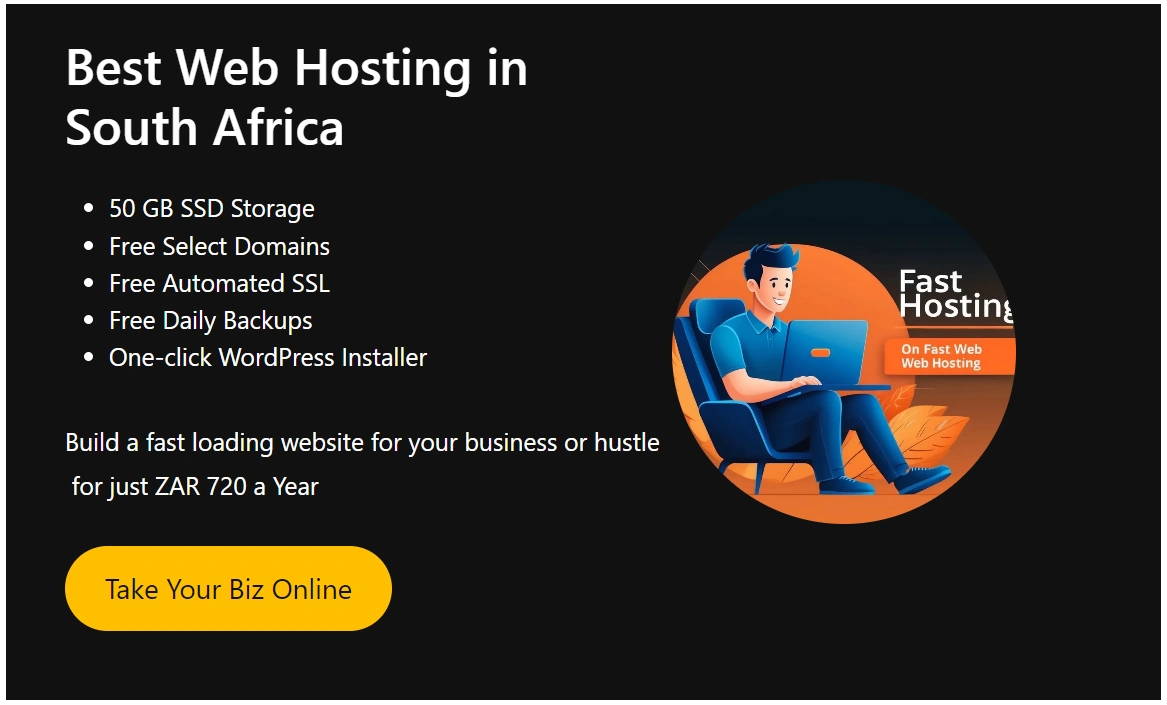The South African e-commerce industry is experiencing a tremendous boom, opening up a myriad of opportunities for business owners.
The digital revolution has changed the way in which consumers shop and interact with businesses, and this provides unprecedented opportunities for entrepreneurs.
As more and more consumers move online to purchase goods and services, it’s becoming increasingly important for companies to tap into this market to remain competitive.
Table of Contents
eCommerce market statistics in South Africa
According to ecommerceDB.com, South Africa is the 42nd largest market for eCommerce with a predicted revenue of US$7,217.8 million by 2023.
The revenue is expected to show a compound annual growth rate (CAGR 2023-2027) of 12.5%, resulting in a projected market volume of US$11,577.2 million by 2027.
In 2020, total online sales jumped by 55% and another 42% in 2021 driven by increased spending in less traditional e-commerce industries.
Related: WordPress eCommerce South Africa: Simple Guide
Business Opportunity #1: Online Marketplaces
Online marketplaces are digital platforms that allow multiple third-party sellers to list and sell their products or services.
These marketplaces enable shoppers to browse through a range of products from different sellers, compare prices and features, read reviews, and make purchases online.
Some popular examples of online marketplaces include Amazon, eBay, Etsy, Airbnb, Uber Eats, and Takealot.
South Africa’s e-commerce sector has been growing rapidly over the past few years due to increased internet penetration rates and changing consumer behavior.
Online marketplaces have played a significant role in this growth by providing a convenient platform for small businesses to reach a wider audience without investing in their own website or marketing efforts.
In addition to physical products like clothing, electronics, and groceries; online marketplaces also facilitate the sale of services such as freelance work or holiday accommodation rentals.
For entrepreneurs looking to tap into the South African e-commerce boom, setting up shop on an established online marketplace can be an attractive option with low entry barriers.
However, it’s important for business owners to carefully consider factors such as commission fees charged by the marketplace provider or competition from other sellers before jumping on board.
Examples of popular South African marketplaces
South Africa has experienced a boom in e-commerce during the COVID-19 pandemic.
As a result, popular marketplaces such as Takealot, Zando, and Superbalist have become go-to destinations for online shoppers.
Takealot is one of the biggest e-commerce players in South Africa and offers a wide range of products from electronics to fashion items.
With over 21 million visits per month, it’s clear that Takealot is one of the most popular online stores in South Africa.
Zando is another leading online fashion retailer that has gained popularity among South African consumers.
The platform offers an extensive selection of clothing items and accessories from local and international brands for men and women.
Additionally, Zando provides delivery services to most major cities across the country.
Superbalist is also a well-known e-commerce platform specializing in young adult fashion items.
Its product range includes clothing, shoes, accessories, beauty products, and home decor items.
Superbalist offers free delivery on orders over R450 ($29) and allows customers to pay with various payment options such as credit card or EFT (Electronic Funds Transfer).
Advantages and disadvantages of selling on marketplaces
One of the biggest advantages of selling on marketplaces is the increased visibility for your products.
With millions of visitors every day, online marketplaces provide a platform to reach a wider audience that may not have found your business otherwise.
Also, many marketplaces offer marketing and promotional tools to help boost sales and increase brand awareness.
However, there are also disadvantages to consider when selling on marketplaces.
One major drawback is the lack of control over the customer experience.
Marketplaces handle customer service and shipping logistics, which means you may not have as much control over how your products are packaged or delivered.
Additionally, marketplace fees can eat into profit margins if not factored into pricing strategies.
Despite these potential disadvantages, selling on marketplaces can still be a lucrative option for businesses looking to expand their online presence and reach new customers in South Africa’s growing e-commerce landscape.
Tips for success on marketplaces
One of the most important aspects of success on marketplaces is optimizing your product listings.
This involves creating a detailed and accurate description, using high-quality images to showcase your products, and including relevant keywords for search engine optimization.
It’s essential to ensure that your pricing is competitive with similar products on the marketplace.
Another way to increase your chances of success on marketplaces is by offering exceptional customer service.
Responding promptly to inquiries and addressing any issues or concerns can help build customer trust and encourage positive reviews.
It’s also crucial to maintain a high level of professionalism in all communications with buyers.
Finally, as you grow your presence on marketplaces, don’t forget about the importance of building relationships with repeat customers.
Offering promotions or discounts for return customers can help encourage them to choose you over competitors in the future.
Related: Online Business Loans in South Africa – A Comprehensive Guide
Business Opportunity #2: Niche E-commerce Stores
Niche e-commerce stores are online retail businesses that specialize in selling products to a specific target audience.
Unlike general e-commerce stores, niche stores focus on a particular product line or category, catering to the needs and preferences of a specific group of customers.
These stores have become increasingly popular due to the rise of social media marketing and digital advertising.
They offer a unique customer experience by providing personalized product recommendations and customized shopping experiences.
Niche e-commerce stores can be created for any type of product or service as long as there is demand from consumers.
For instance, some popular niches include eco-friendly products, luxury items, organic foods, pet supplies, and handmade crafts.
By offering products that cater to specific interests or needs, these niche e-commerce stores can stand out from their competitors.
One advantage of starting a niche e-commerce store is that it requires less investment than setting up a brick-and-mortar store.
And since you will be targeting a smaller customer base with your marketing efforts, you can save on advertising expenses while enjoying higher conversion rates.
However, it’s important to conduct thorough market research before launching your store to ensure that there is sufficient demand for your chosen niche and that you can compete effectively with other established players in the market.
Examples of successful niche stores in South Africa
Faithful to Nature and Yuppiechef are two niche stores that have seen immense success in the South African e-commerce industry.
Faithful to Nature is an online store that offers a wide range of eco-friendly products, including personal care, home cleaning, and organic food items.
The company’s mission is to help customers lead more sustainable lifestyles by providing them with natural alternatives to everyday products.
Yuppiechef, on the other hand, is an online kitchen and homeware store that offers high-quality kitchen appliances and accessories.
The store’s product range includes everything from cookware and bakeware to coffee machines and bar tools.
Yuppiechef has succeeded by offering exceptional customer service, fast delivery times, and a user-friendly website.
Both of these niche stores have managed to tap into a growing demand for ethical consumption and sustainability in South Africa.
By catering to specific customer needs with high-quality products and excellent service, they have been able to build loyal customer bases over time.
For entrepreneurs looking for business opportunities in the South African e-commerce industry, these examples serve as inspiration for creating successful niche stores that cater to specific consumer demands.
Benefits of niche stores
One significant advantage of operating a niche store is that it allows business owners to target their audience more effectively.
Compared to general stores, niche stores focus on specific products or services that cater to the needs of a particular group of customers.
This approach increases the likelihood of finding and retaining loyal customers who are passionate about the same interests as the business.
Furthermore, niche stores tend to enjoy higher profit margins than general stores due to their specialized and unique offerings.
Since these businesses offer products or services that are not widely available in other places, they can price them with a premium.
Additionally, because they do not need to carry an extensive product line like general stores, they have lower overhead costs such as inventory management and marketing expenses.
Tips for starting a niche store in South Africa
Starting a niche store is not just about identifying a unique niche. It also involves conducting thorough market research.
The first step is to identify the right niche for your business. This will require you to understand the market trends and customer preferences in South Africa.
You can start by researching online, looking at social media trends, and analyzing search engine data.
Once you have identified a potential niche, conducting more in-depth research is important.
This includes understanding your target audience, their needs and preferences, and what they are willing to pay for your products or services.
You should also analyze your competitors’ strengths and weaknesses to find gaps in the market that you can fill with your unique offerings.
Furthermore, building an effective marketing strategy that will help you reach out to potential customers while staying within budget constraints is essential.
This may involve utilizing social media platforms such as Facebook and Instagram or collaborating with influencers in the industry who can promote your brand on their channels.
Remember that starting a successful niche store requires patience, persistence, and a willingness to learn from successes and failures.
Business Opportunity #3: Subscription Box Services
Subscription box services is a popular e-commerce model that has seen significant growth in recent years.
The concept involves curating a monthly selection of products based on a particular theme or interest and delivering them directly to the customer’s doorstep.
These boxes can include anything from makeup and skincare products to food items, books, clothing, and toys.
One of the biggest advantages of subscription box services is their ability to offer consumers personalized experiences tailored to their individual interests.
Customers can choose from a wide range of subscription options and have access to exclusive items that they may not find elsewhere.
Also, the convenience factor cannot be overlooked as customers no longer need to spend time searching for new products or going out to purchase them.
Subscription box services could present an exciting opportunity for entrepreneurs looking to tap into the South African e-commerce boom.
With rising consumer demand for curated experiences and convenience-driven solutions, this space has ample room for innovative business models.
By understanding what consumers want and providing unique offerings that cater to niche interests, entrepreneurs can carve out a profitable market share in this growing industry.
Examples of popular South African subscription boxes
Subscription boxes are a growing trend in South Africa, with many businesses offering monthly deliveries of curated products to their subscribers.
One popular option is uOpen, which offers a range of subscription boxes for beauty, food and drink, crafts and hobbies, as well as books and stationery.
Their mission is to help customers discover new brands and products they love through the convenience of doorstep delivery.
Another noteworthy subscription box service is The Oolala Collection Club.
This company specializes in luxury lifestyle items such as home decor pieces, fashion accessories, gourmet snacks and artisanal skincare products sourced from around the world.
Their unique curation process ensures that every box contains premium quality items that cater to different preferences.
Other notable South African subscription boxes include;
- Faithful to Nature’s monthly eco-friendly essentials package called “The Good Bag”
- Pet Box for pet owners who want regular deliveries of treats and toys for their furry friends, and
- Coffee Capsule Delights for coffee enthusiasts who want to try different blends each month.
Benefits of subscription boxes
Subscription boxes have become increasingly popular in South Africa, as they offer numerous benefits to both businesses and customers.
Firstly, subscription boxes provide a reliable source of recurring revenue for businesses.
With a steady stream of subscribers who pay monthly or quarterly fees, companies can accurately predict their cash flow and plan accordingly.
In addition to financial stability, subscription boxes also foster customer loyalty.
By offering personalized and curated products on a regular basis, businesses can create an emotional connection with their subscribers.
This leads to higher retention rates and word-of-mouth referrals from satisfied customers.
Moreover, subscription boxes allow companies to gain valuable insights into consumer preferences through data analysis.
This information can be used to fine-tune product offerings and improve the overall customer experience.
As e-commerce continues to thrive in South Africa, subscription boxes present an opportunity for businesses to tap into this growing market while providing added value for consumers.
Tips for starting a subscription box service in South Africa
When starting a subscription box service in South Africa, it is essential to select the right products that will appeal to your target audience.
This requires conducting thorough market research and understanding the needs and preferences of your potential customers.
You should also consider sourcing high-quality products from reliable suppliers, ensuring that they align with your brand values.
In addition to selecting the right products, subscription box services can offer customization options to enhance customer satisfaction.
This could involve allowing customers to choose their preferred product types or providing personalized packaging or branding options.
Offering flexibility in billing cycles and cancellation policies can also improve customer retention rates and help build long-term relationships with subscribers.
Related: #8 Most Profitable Online Businesses in South Africa
Business Opportunity #4: Dropshipping
Another one of the most popular eCommerce business opportunity in South Africa is dropshipping!
In itself, dropshipping is a business model that allows entrepreneurs to sell products online without holding any inventory.
Essentially, you act as a middleman between the customer and the supplier.
When someone orders a product on your website, you purchase it from the supplier at a wholesale price and have it shipped directly to the customer.
The difference between what you charge for the product and what you pay for it goes into your pocket as profit.
The beauty of dropshipping is that it requires very little upfront investment compared to traditional retail models.
You don’t need to worry about stocking shelves or investing in expensive equipment – all you need is an online store and some marketing savvy.
Plus, because you’re not purchasing inventory in bulk, you don’t run the risk of being stuck with unsellable items if they don’t move.
However, there are some challenges associated with dropshipping as well.
Since you are reliant on suppliers to fulfill orders, there can be issues with shipping times or out-of-stock items.
And because anyone can start a dropshipping store relatively easily, competition can be fierce.
To succeed in this business model, staying on top of trends and offering unique products or value-added services that set your store apart from others in the market is important.
Benefits of dropshipping in South Africa
This business model has numerous benefits, including low startup costs and no inventory management.
When you choose to dropship, you do not have to invest in products upfront.
You only order the products after your customers place orders on your website.
Another benefit of dropshipping is that it allows for flexibility and scalability. With a traditional retail business, growth can be limited by the need for physical space to store inventory.
However, with dropshipping, there are no limits on how much product you can sell because you do not need any storage space.
In addition to these two benefits, dropshipping also allows entrepreneurs the freedom to work from anywhere in the world as long as there is internet connectivity.
It requires minimal financial investment and offers great potential for earning passive income once established.
In short, if you want to get into e-commerce in South Africa but don’t have much capital or want to avoid the hassle of managing inventory, then dropshipping could be perfect for you!
Tips for starting a dropshipping business in South Africa
Finding reliable suppliers is one of the most important aspects of starting a successful dropshipping business.
It’s crucial to do your research and select suppliers who offer high-quality products, reasonable prices, and timely delivery.
Look for suppliers with good reviews and ratings from other dropshippers in your niche.
You can also attend trade shows or connect with suppliers on online marketplaces.
In addition to finding reliable suppliers, selecting profitable products is another key factor in the success of your dropshipping business.
Conduct thorough market research to identify popular trends and niches that have high demand but low competition.
Look for products with a healthy profit margin and consider offering unique or personalized items that stand out from competitors.
Lastly, focus on building strong relationships with both customers and suppliers.
Offer excellent customer service, respond promptly to inquiries or concerns, and be transparent about shipping times and product availability.
Cultivate open lines of communication with your suppliers to ensure smooth operations and avoid any potential issues that may arise in the future.
Business Opportunity #5: Social Media Commerce
According to DaraReportal.com, the number of social media users in South Africa at the start of 2022 was equivalent to 46.4 percent of the total population.
So if there’s an eCommerce opportunity, it is on social media!
Social media commerce, also known as social commerce, refers to the use of social media platforms for buying and selling products or services.
It involves the integration of online shopping into social media networks, which enables users to purchase goods without leaving their favorite social platform.
Social media commerce has emerged as a lucrative e-commerce channel in recent years due to its ability to blend convenience with engagement.
The beauty of social media commerce is that it leverages the power of peer recommendations and user-generated content to create a more personalized shopping experience.
With over 29 million active users on Facebook alone in South Africa, businesses can tap into this vast audience by creating shoppable posts that allow customers to make purchases directly on their feeds.
Instagram’s shoppable tags are another example of how brands are using social channels for e-commerce purposes.
Social media commerce not only benefits businesses but also enhances customer experiences by making it easy for them to discover new products and shop seamlessly within their preferred networks.
As such, entrepreneurs looking to tap into the South African e-commerce boom should consider incorporating social media commerce strategies into their overall marketing plans.
Examples of social media commerce in South Africa
Instagram Shops, for instance, allow businesses to set up online stores within their Instagram profiles.
These shops facilitate a seamless shopping experience for consumers who can browse through products and make purchases without leaving the app.
Many local brands have already embraced this feature and are successfully selling products ranging from clothing to cosmetics.
WhatsApp Business is another social media tool that has gained traction among South African entrepreneurs.
This messaging app allows businesses to communicate easily with customers about orders, promotions, and other inquiries.
Some small businesses have even adopted WhatsApp as their primary sales platform, allowing customers to place orders directly through the app.
Advantages and disadvantages of selling on social media in South Africa
One of the biggest advantages is that it allows businesses to reach a wider audience without needing a physical storefront.
Social media platforms also offer features such as targeted advertising and influencer partnerships, which can be used to build brand awareness and generate leads.
Also, social media allows for real-time communication with customers, providing opportunities for feedback and customer service.
However, there are also some disadvantages to consider when selling on social media.
One major challenge is standing out among the competition, as there are many other businesses vying for attention on these platforms.
Another potential drawback is the lack of control over the platform itself; changes in algorithms or policies can impact a business’s ability to reach its audience or advertise effectively.
There may also be issues with payment processing or disputes if transactions occur directly through social media rather than a dedicated e-commerce platform.
Tips for success in selling on social media in South Africa
To succeed on social media, creating engaging content that resonates with your target audience is crucial.
This may include visually appealing graphics, interesting captions, and relevant hashtags.
Consistency is also key – posting regularly can help keep your brand top-of-mind for followers.
Building a loyal following takes time and effort.
One way to do this is by engaging with your audience by responding to comments and direct messages promptly.
Hosting giveaways or contests can also incentivize followers to share your content with their friends and family, increasing your reach organically.
Finally, tracking engagement and follower growth metrics can help guide your social media strategy.
Analyzing these numbers can provide insight into what types of content perform well and how you can continue improving your online presence to drive business growth.
Business Opportunity #6: B2B E-commerce
Here’s another booming eCommerce opportunity in South Africa; selling to other businesses.
B2B e-commerce refers to the buying and selling of goods or services between two businesses.
It is a digital exchange that streamlines the procurement process, making it faster, more efficient and cost-effective.
Unlike B2C e-commerce which targets consumers, B2B e-commerce focuses on meeting the needs of other businesses.
One key benefit of B2B e-commerce is its ability to provide access to a wider range of potential customers.
Online platforms allow companies to showcase their products/services and reach out to buyers beyond their physical location. Additionally, it eliminates geographical barriers that may hinder traditional trade.
Another advantage of B2B e-commerce is its automation capabilities which can help reduce manual labour costs associated with traditional procurement methods such as paperwork, phone calls and email exchanges.
This can result in significant time savings for both buyers and sellers while improving accuracy levels in order fulfillment processes.
Examples of B2B e-commerce platforms in South Africa
Supplycart and Bidorbuy Business are two examples of B2B e-commerce platforms in South Africa.
Supplycart is a procurement platform that aims to simplify the purchasing process for businesses by providing them with a centralized ordering system.
The platform offers a wide range of products, from office supplies to IT equipment, catering to various industries like healthcare, education, and hospitality.
Supplycart also allows companies to track their expenses and generate reports for better financial management.
On the other hand, Bidorbuy Business is an online marketplace that connects suppliers and buyers in South Africa.
The platform caters specifically to B2B transactions by offering bulk discounts on products such as electronics, fashion accessories, and industrial equipment.
With over 1 million registered users and 15 years of experience in the e-commerce industry, Bidorbuy Business is considered one of the largest online marketplaces in South Africa.
These two e-commerce platforms showcase how businesses can benefit from using technology to streamline their procurement processes while accessing a wider range of products at lower prices.
As more companies shift towards digitalization due to the COVID-19 pandemic, opportunities arise for entrepreneurs who can provide innovative solutions in this space.
Benefits of selling to other businesses
Selling products or services to other businesses can be a smart move for many reasons.
Firstly, selling in bulk to another business increases the size of the order and boosts revenue immediately.
Secondly, it creates a steady stream of repeat customers who will likely place orders more frequently than individual consumers.
This is because businesses have ongoing needs and requirements that must be met regularly.
In addition, selling to other businesses can also result in long-term partnerships that mutually benefit both parties involved.
By building a strong relationship with your business clients, you may earn their trust and loyalty, which could also lead to referrals from them.
It’s important to note that when selling B2B (business-to-business), it requires a different approach compared to B2C (business-to-consumer) sales tactics.
Understanding your target audience’s specific needs, pain points and goals will help tailor your sales approach accordingly.
Furthermore, ensure that your customer service is top-notch as B2B clients often expect personalized attention and prompt communication.
Tips for starting a B2B e-commerce business in South Africa
Identifying a profitable niche is an essential step in starting a B2B e-commerce business.
Researching the market and analyzing customer behavior can help determine which products or services are in demand.
It’s important to consider factors such as competition, pricing, and target audience when selecting a niche.
Additionally, understanding the needs of potential customers and creating solutions for their pain points can help differentiate a business from competitors.
Building relationships with suppliers is another critical aspect of starting a B2B e-commerce business.
Suppliers play an integral role in providing quality products at competitive prices, ensuring timely delivery, and maintaining inventory levels.
Establishing strong communication channels with suppliers can lead to better deals on bulk orders and improve overall supply chain management.
Furthermore, investing in powerful e-commerce platforms that offer robust features like;
- inventory management system integration
- easy-to-use online store builders
- order tracking systems
- secure payments gateway integration can go along way towards ensuring success for your B2B e-commerce venture.
Related: How To Register An Online Business In South Africa
Business Opportunity #7: E-commerce Consulting Services
One last eCommerce business opportunity in South Africa we are looking at today is consulting!
E-commerce consulting services are becoming increasingly popular in South Africa, as more businesses look to capitalize on the growing e-commerce market.
These services typically involve expert advice and guidance for businesses looking to establish or improve their online presence.
This can include everything from website design and development, to digital marketing strategies, payment gateway integration, and logistics management.
One key benefit of working with an e-commerce consultant is that they have a wealth of knowledge and experience in the industry.
They can help businesses navigate the complex world of online sales and marketing, providing insights into consumer behavior, competitor analysis, and best practices for driving traffic and sales.
Consultants may also offer training or support for business owners who want to learn more about managing their own e-commerce operations.
How to start an e-commerce consulting business in South Africa
Developing a niche is the first step to starting an e-commerce consulting business.
This means identifying an area of expertise that you can offer unique insights into, such as social media marketing for e-commerce businesses or supply chain management optimization.
See, by focusing on a specific niche, you can establish yourself as an expert in that field and build a reputation for providing valuable insights and advice.
Next, building a strong network is also crucial for success in the e-commerce consulting business.
This includes building relationships with potential clients, industry experts, and other professionals who can refer business to you or provide support and advice when needed.
Attending networking events, participating in online forums, and connecting with relevant individuals on social media are all effective ways to build your network.
In addition to developing a niche and building a strong network, staying up-to-date with the latest trends and technologies in the e-commerce industry is important.
This means reading industry publications, attending conferences and webinars, and staying engaged with online communities where discussions about emerging trends are taking place.
By keeping your finger on the pulse of the industry, you’ll be able to offer informed advice that helps your clients stay ahead of their competitors in this fast-moving space.
Related: How To Start A Website In South Africa in 2 Easy Steps
 Web Hosting
Web Hosting Windows HostingBuilt for Windows apps and websites – stability, speed and flexibility
Windows HostingBuilt for Windows apps and websites – stability, speed and flexibility Reseller HostingLaunch a hosting business without technical skills or expensive infrastructure
Reseller HostingLaunch a hosting business without technical skills or expensive infrastructure Affiliate ProgramRefer customers and earn commissions from sales across our platform
Affiliate ProgramRefer customers and earn commissions from sales across our platform Domain SearchFind and secure a domain name in seconds with our quick lookup tool
Domain SearchFind and secure a domain name in seconds with our quick lookup tool CO ZA Domains
CO ZA Domains All DomainsExplore domain names from over 324 TLDs globally – all in one place
All DomainsExplore domain names from over 324 TLDs globally – all in one place Free Whois Lookup Tool South Africa
Free Whois Lookup Tool South Africa VPS
VPS SSLs
SSLs









